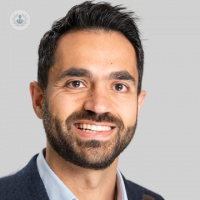Swallowing difficulties: All about dysphagia
Autore:If you have difficulty swallowing, it means you have dysphagia. In some cases, people with dysphagia have difficulties swallowing specific foods, whilst others are unable to swallow anything.
The World Gastroenterology Organisation estimates that around 1 in 17 people will develop some form of dysphagia in their lives. Although dysphagia is generally more common among older adults, it can happen at any age.
Dr Sarmed Sami, renowned consultant gastroenterologist in London, explains all about dysphagia in this article.

What happens with dysphagia?
Dysphagia symptoms can vary depending on each case.
Symptoms include:
- pain or difficulty when swallowing (also known as odynophagia)
- feeling like food is stuck in the throat or chest
- being unable to swallow
- hoarse voice
- frequent heartburn
Additionally:
- regurgitating food
- drooling
- unexpected weight loss
- gagging or coughing when swallowing
- having to avoid specific foods due to difficulty swallowing
What causes difficulty swallowing?
Dysphagia is a symptom which usually develops as a result of other health problems, including:
- Conditions related to the nervous system, such as dementia, head injury, brain tumours, or stroke
- Types of cancer, such as throat cancer or oesophageal cancer
- Gastro-oesophageal reflux disease
- Eosinophilic oesophagitis
- Achalasia
Other causes of dysphagia can include congenital conditions (conditions present from birth) such as cerebral palsy or cleft lip. It can develop in children due to learning disabilities as well.
How is dysphagia treated?
In most cases, swallowing difficulties can be treated, but it depends on what type of dysphagia the patient has. There are a number of other factors to be taken into account when attempting to treat dysphagia, such as what causes the dysphagia and whether the swallowing difficulties are due to a problem in the throat, the gullet (oesophagus) or the mouth.
In some cases where the dysphagia has developed as a result of another health problem, such as mouth cancer or throat cancer, treating the cause can alleviate dysphagia symptoms.
Although a complete cure is unfortunately not always feasible, these following dysphagia treatments can help:
- Using language and speech therapy in order to learn new techniques for swallowing
- Making foods safer to swallow
- Using alternative ways to feed the patient, such as through a tube into the nose or stomach
- Widening the oesophagus with surgery or endoscopy
If you require expert diagnosis and treatment for dysphagia, don't hesitate to book an appointment with Dr Sarmed Sami via his Top Doctors profile today.


